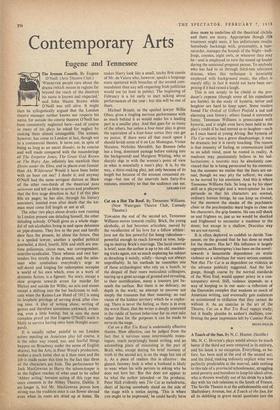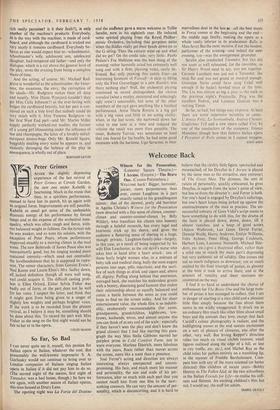A Touch of the Sun. By N. C. Hunter. (Saville.)
MR. N. C. HUNTER'S plays would always be much better if the third act were removed in its entirety, and his latest is no exception. Everything, as be- fore, has been said at the end of the second act; and the third,-making tediously explicit what was perfectly predictable at the interval, adds nothing to this tale of a provincial schoolmaster, struggling amid poverty and boredom to keep his ideals alive, who is thrown woefully out of his stride by a holi- day with his rich relations in the South of France. The Saville Theatre is at the unfashionable end of Shaftesbury. Avenue, but A Touch of the Sun, for all its dabbling in grave social questions (are the rich really parasites? is it their fault?), is only another of the machine's products. Everybody, as is the way with the machine, is made of card- board, and although the cardboard is tricked out very nicely it remains cardboard. Everybody be- haves as one would expect him to—schoolmaster, schoolmaster's wife, adolescent son, adolescent daughter, bad-tempered old father—and only the dialogue, which is a cut above the general level of the play, saves the evening from being a complete waste of time.
And the acting, of course. Mr. Michael Red- grave is wonderful as the schoolmaster; the bitter- ness, the meanness, the envy, the corruption of his ideals—Mr. Redgrave makes them all deep and innerly. Miss Diana Wynyard (couldn't they get Miss Celia Johnson?) as the ever-loving wife bulges the cardboard bravely, but her part is con- ceived on such a trite level that nobody could do very much with it. Miss Vanessa Redgrave—in her first West End part—and Mr. Martin Miller supply perfectly worked-out studies, the former of a young girl blossoming under the influence of sun and champagne, the latter of a lovably mittel- european money-bags. Only Mr. Ronald Squire, hoggishly stealing every scene he appears in, and violently deranging the balance of the play in consequence, is wholly out of place. BERNARD LEVIN



































 Previous page
Previous page